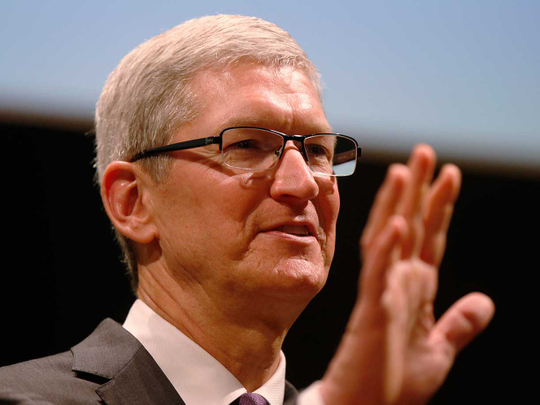
US presidential candidate Donald Trump called on Saturday for consumers to boycott Apple products until the tech giant cooperates with the US Federal Bureau of Investigation (FBI) to help ‘unlock’ the iPhone used by one of the San Bernardino terrorists. The move follows Apple’s refusal to comply with the order last week of a US federal magistrate that the firm assist the FBI.
The issue, which could become a significant one too in the US Congress with hearings already scheduled for March, sees the most valuable US company by market capitalisation at loggerheads with the country’s powerful law enforcement agency. Throughout the process, Apple has sought to make clear that while it was “shocked and outraged” by the San Bernardino attacks, which killed 17 people, and has “no sympathy for terrorists”, it is nonetheless refusing to comply with the FBI because it asserts this would be an “unprecedented step which threatens the security of our customers”.
The spat follows a decision by Apple last year to enhance encryption on its iPhones. With this change, the tech giant has said that it will not unlock devices for authorities, even if faced with a warrant, claiming that doing so would set a legal precedent that the government could seek to utilise again and again.
The issue is a sensitive one in the US right now, with significant concerns about the possibility of further terrorist attacks on the US homeland or on overseas US interests. The FBI also asserts that Apple has complied with similar requests in the past, before it tightened the security of its products.
What this episode highlights, post the Edward Snowden revelations about US surveillance practices, are concerns not just in the US, but right around the world, including from foreign governments, over the appropriate balance between national security and consumer privacy. Snowden’s allegations have alarmed many, not least in Europe, and this led to the European Court of Justice last October ruling invalid a 15-year-old transatlantic data protection agreement called Safe Harbour because it allegedly allowed US authorities to gain regular access to European online information, infringing European rights to privacy.
Inevitably, this has put some US technology firms on the defensive with concern that the domestic and international fallout from the surveillance programme revelations could have damaged their reputation. This point was reportedly noted last month by Sina Marie Beaghley, former director of Intelligence and Information Security on the National Security Council, who asserted that “the reality was that it hurt US companies’ bottom lines to be perceived as being complicit with the US government”.
This underscores the potential for business decisions, whatever their motivation, to become intertwined with foreign relations among states and companies, in effect, blurring the traditional public and private sector concerns of public policy and corporate affairs, respectively, in sometimes thorny issues of political, human rights and/or legal issues.
To be sure, this is not a new phenomenon by any means, but nonetheless appears to be increasing in incidence and salience. Partly, this is driven by globalisation, and also the growth of key industries including new technology.
In the technology area alone, firms have been caught in controversy on numerous occasions in recent years. For instance, during the revolution which overthrew Egyptian President Hosni Mubarak in 2011, some companies were forced by the regime to temporarily shut down their networks. Meanwhile, Google and Twitter collaborated on a ‘tweet to speak’ programme, which was used as a communications platform by some anti-Mubarak protesters.
Diplomatic row
Moreover, Google unintentionally sparked a diplomatic row in 2013 following a decision to change the name on its “Palestinian territories” homepage to “Palestine”. The move, which Palestinian President Mahmoud Abbas reportedly called a “victory for Palestine and a step towards its liberation”, provoked immediate Israeli government complaint to the firm. Israeli Foreign Ministry spokesman Yigal Palmor, for instance, asserted that “Google is not a diplomatic entity which begs the question why they are getting involved in international politics and on the controversial side”. To be clear, new technology firms are not alone in experiencing issues from working with diverse political authorities across the world. Indeed, internationally-focused companies in many other industries, ranging from energy and extractives, to fast moving consumer goods, have long been confronted with challenges too
In this complex — sometimes uncharted — territory, firms (and indeed entire industries) can attract high profile scrutiny. For instance, Members of the European Parliament passed a resolution in February 2010, following the disputed Iranian presidential election of 2009, which called on EU institutions immediately to “ban the export of surveillance technology by European companies to governments and countries such as Iran”.
To be sure, various international codes of conduct, including the UN Guiding Principles on Business and Human Rights already exist and reinforce the corporate social responsibility practices of individual firms. However, some of the most enlightened companies have recognised the need for a more decisive shift toward what has been termed strategic “corporate foreign policy.”
Corporate foreign policy aligns a firm’s external affairs activity, including media relations, risk management, corporate social responsibility, government affairs and operational planning, in a clear strategic framework. Recognising the need for an unusual mix of core competences (e.g. in advanced diplomacy) in some of these corporate functions, capability (including tools, training and infrastructure) can be enhanced where any gaps exist.
Other example areas of capability where firms occasionally have gaps include foresight and horizon scanning to anticipate and plan for social, economic and political opportunities and risks. Firms may also need clearer internal guidance for determining decision-making, protecting stakeholders (including customers), and/or remaining faithful to corporate values, especially in fast-moving, unpredictable, crisis situations. The relentless march of globalisation, with the interconnections this brings, means that few international companies will escape these pressures completely. And at the same time, owing to proliferation of media, and the influence of NGOs and related stakeholders, the actions of firms are increasingly under the microscope.
For those companies which are pro-active and invest in their capability, the prizes (both in terms of mitigating risk and seizing opportunity) are potentially ever more significant. Yet for those which are perceived to misstep, the fallout can be increasingly damaging, both reputationally and also for the financial bottom line.
Andrew Hammond is an Associate at LSE IDEAS (the Centre for International Affairs, Diplomacy and Strategy) at the London School of Economics










